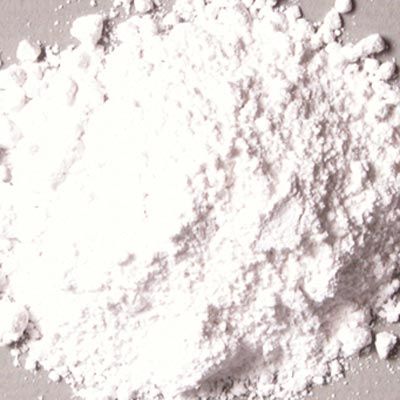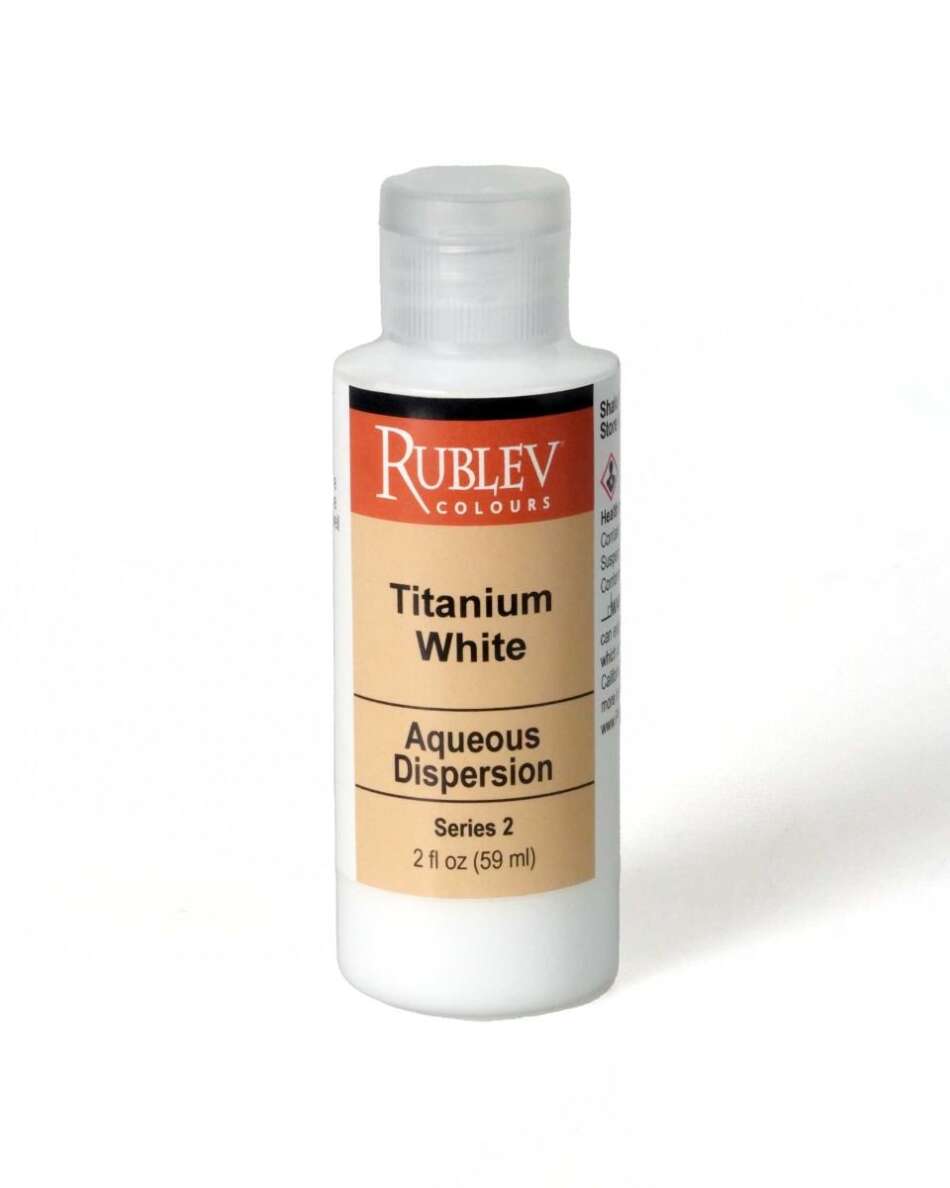Titanium White 2 fl oz
$13.20
In stock
SKU
275-212
Titanium dioxide is a synthetic white pigment with high hiding power, nontoxic, permanent, and usable in all medium.
Titanium dioxide white pigments are developments of the 20th century, and because of their high hiding power, nontoxic nature, and reasonable cost, they have eclipsed other traditional white pigments. Anatase and rutile are naturally occurring mineral forms of titanium dioxide that synthesized as pigments.
Rublev Colours Aqueous Dispersions are pigments dispersed in water ready to be mixed with water-based mediums. These dispersions are especially made for use with traditional painting mediums, such as egg tempera, casein tempera, fresco, watercolors and distemper (glue tempera). They are also ideally suited for use with gesso to make toned grounds for drawing and painting. Pigment dispersions from Rublev Colours contain only naturally-derived ingredients, in addition to pigment and water, making them ideally suited for traditional mediums. Unlike other pigment dispersions that are typically made for acrylic medium, Rublev Colours Aqueous Dispersions do not contain coalescent solvents, artificial dispersing resins and other additives that interfere with natural mediums. Aqueous Dispersions make preparing traditional mediums easy; you do not have to hassle with powders, grinding pigments in medium and calculating binder ratios to make water-based paint. They make adding the right amount of paint binder, such as egg yolk, a no brainer because the right amount of water is already contained in the dispersion, simply add egg yolk.
Origin and History
Titanium white can refer to any pigment containing a compound of titanium. The name permanent white has been applied to many pigments, including titanium dioxide whites. Such imprecise names can cause confusion and many are still used today. At the beginning of the 20th century development of titanium dioxide white pigment occurred simultaneously in Norway and the United States. Several processes were later developed and patented by companies in both countries. Use of titanium dioxide as a white pigment in artist's palettes began in field tests as early as 1916, but it wasn't until the 1940's that widespread use of the pigment began.
Source
Permanence and Compatibility
Both rutile and anatase forms of titanium dioxide white are lightfast. However, according to Marilyn Laver, exposure to light can cause a phototropic color change under certain circumstances. Rutile undergoes this reversible color change to a lesser extent than does anatase. The rutile and anatase pigment forms are both chemically inert, and do not react with airborne pollutants, organic solvents and other pigments. Some suggest that the resistance of titanium dioxide pigments to acids and alkalies is an advantage for their use in true fresco.
Oil Absorption and Grinding
Titanium dioxide absorbs a moderate amount amount of oil. The oil absorption ratio is 15–20 parts by weight of oil to 100 parts by weight of pigment. If the measurement were grams, it would require 15 to 20 grams (by weight) of linseed oil to grind 100 grams (by weight) of pigment to form a stiff paste. It makes an average drying oil paint, and forms a soft, brittle film.
Toxicity
Titanium dioxide is not considered to be hazardous, but care should be used in handling the dry powder pigment to avoid inhaling the dust.

Pigment: Titanium White
Rublev Colours Aqueous Dispersions are pigments dispersed in water ready to be mixed with water-based mediums. These dispersions are especially made for use with traditional painting mediums, such as egg tempera, casein tempera, fresco, watercolors and distemper (glue tempera). They are also ideally suited for use with gesso to make toned grounds for drawing and painting. Pigment dispersions from Rublev Colours contain only naturally-derived ingredients, in addition to pigment and water, making them ideally suited for traditional mediums. Unlike other pigment dispersions that are typically made for acrylic medium, Rublev Colours Aqueous Dispersions do not contain coalescent solvents, artificial dispersing resins and other additives that interfere with natural mediums. Aqueous Dispersions make preparing traditional mediums easy; you do not have to hassle with powders, grinding pigments in medium and calculating binder ratios to make water-based paint. They make adding the right amount of paint binder, such as egg yolk, a no brainer because the right amount of water is already contained in the dispersion, simply add egg yolk.
| Pigment Names | |
| Common Names (pigment): | English: titanium dioxide French: oxyde de titane German: Titandioxid Italian: bianco di titanio Japanese: チタニウム二酸化物 Norwegian: titandioksid Russian: двуокись титана Spanish: dióxido de titano |
| Common Names (Variety): | English: anatase, rutile French: anatase, rutile German: Anatas, Rutil Italian: anatasio, rutilo Norwegian: anatas, rutil Russian: анатаз, рутил Spanish: anatasa, rutilo |
| Alternate Names: | Titania, titanium white, permanent white |
Origin and History
Titanium white can refer to any pigment containing a compound of titanium. The name permanent white has been applied to many pigments, including titanium dioxide whites. Such imprecise names can cause confusion and many are still used today. At the beginning of the 20th century development of titanium dioxide white pigment occurred simultaneously in Norway and the United States. Several processes were later developed and patented by companies in both countries. Use of titanium dioxide as a white pigment in artist's palettes began in field tests as early as 1916, but it wasn't until the 1940's that widespread use of the pigment began.
Source
Permanence and Compatibility
Both rutile and anatase forms of titanium dioxide white are lightfast. However, according to Marilyn Laver, exposure to light can cause a phototropic color change under certain circumstances. Rutile undergoes this reversible color change to a lesser extent than does anatase. The rutile and anatase pigment forms are both chemically inert, and do not react with airborne pollutants, organic solvents and other pigments. Some suggest that the resistance of titanium dioxide pigments to acids and alkalies is an advantage for their use in true fresco.
Oil Absorption and Grinding
Titanium dioxide absorbs a moderate amount amount of oil. The oil absorption ratio is 15–20 parts by weight of oil to 100 parts by weight of pigment. If the measurement were grams, it would require 15 to 20 grams (by weight) of linseed oil to grind 100 grams (by weight) of pigment to form a stiff paste. It makes an average drying oil paint, and forms a soft, brittle film.
Toxicity
Titanium dioxide is not considered to be hazardous, but care should be used in handling the dry powder pigment to avoid inhaling the dust.

Pigment: Titanium White
| Pigment Information | |
| Color: | White |
| Colour Index: | Pigment White 6 (77891) |
| Chemical Name: | Titanium Dioxide |
| Chemical Formula: | TiO2 |
| ASTM Lightfastness Rating | |
| Watercolor: | I |
| Properties | |
| Density: | 4.0 (rutile) |
| Hardness: | – |
| Refractive Index: | n=2.72 (rutile) |
| SKU | 275-212 |
|---|---|
| Brand | Rublev Colours |
| Vendor | Natural Pigments |
| Processing Time | Usually ships the next business day. |
| Size | 2 fl oz (59.1 ml) |
| Color | White |
![]() WARNING: This product can expose you to chemicals including titanium dioxide (airborne, unbound particles of respirable size), which is known to the State of California to cause cancer. For more information go to www.P65Warnings.ca.gov.
WARNING: This product can expose you to chemicals including titanium dioxide (airborne, unbound particles of respirable size), which is known to the State of California to cause cancer. For more information go to www.P65Warnings.ca.gov.



